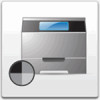Lexmark Monochrome Laser Complete Printer Reference (1.7 MB) - Page 111
Collating print jobs, Paper handling, Technical Reference
 |
View all Lexmark Monochrome Laser manuals
Add to My Manuals
Save this manual to your list of manuals |
Page 111 highlights
The following figure, on the other hand, illustrates a 4 Up print job in portrait orientation with Vertical selected as the Multipage Order. The page images are paginated from top to bottom. Page 1 Page 3 Page 2 Page 4 You can select n-up printing from the printer driver, from MarkVision, or from the Finishing Menu on the printer operator panel. Refer to the Technical Reference for detailed explanation of the n-up printing commands. Collating print jobs Setting Collation On in the Finishing Menu lets you collate multiple copies of print jobs. When you use the printer Collation feature to organize copies, the printer uses the Copies setting to determine how many collated copies to print. For example, if Collation is set to On, your print job is three pages long, and you request two copies, your job prints in the following page order: 1, 2, 3, 1, 2, 3. On the other hand, if Collation is set to Off, your job prints as 1, 1, 2, 2, 3, 3. The Collation - Collated Copies (QTY) setting also lets you collate copies of print jobs, but does not use the value of the Copies setting to determine how many copies to print. You provide the number of collated copies with this setting. For example, if you set Collation - Collated Copies (QTY) to 2, your three-page job prints in the following page order: 1, 2, 3, 1, 2, 3. Note: When Collation - Collated Copies (QTY) is set to any value except Off, the printer ignores the value of the Collation setting. Paper handling 111















